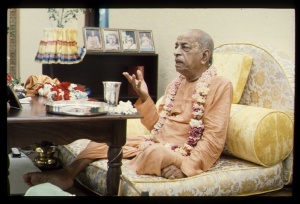CC Adi 14.61: Difference between revisions
No edit summary |
(Vanibot #0054 edit - transform synonyms into clickable links, which search similar occurrences) |
||
| Line 17: | Line 17: | ||
<div class="synonyms"> | <div class="synonyms"> | ||
''ei mata'' | ''[//vanipedia.org/wiki/Special:VaniSearch?s=ei&tab=syno_o&ds=1 ei] [//vanipedia.org/wiki/Special:VaniSearch?s=mata&tab=syno_o&ds=1 mata]'' — in this way; ''[//vanipedia.org/wiki/Special:VaniSearch?s=cāpalya&tab=syno_o&ds=1 cāpalya]'' — cunning behavior; ''[//vanipedia.org/wiki/Special:VaniSearch?s=saba&tab=syno_o&ds=1 saba] [//vanipedia.org/wiki/Special:VaniSearch?s=lokere&tab=syno_o&ds=1 lokere]'' — unto the people in general; ''[//vanipedia.org/wiki/Special:VaniSearch?s=dekhāya&tab=syno_o&ds=1 dekhāya]'' — exhibits; ''[//vanipedia.org/wiki/Special:VaniSearch?s=duḥkha&tab=syno_o&ds=1 duḥkha]'' — unhappiness; ''[//vanipedia.org/wiki/Special:VaniSearch?s=kāro&tab=syno_o&ds=1 kāro]'' — distress; ''[//vanipedia.org/wiki/Special:VaniSearch?s=mane&tab=syno_o&ds=1 mane]'' — in the mind; ''[//vanipedia.org/wiki/Special:VaniSearch?s=nahe&tab=syno_o&ds=1 nahe]'' — there is no such thing; ''[//vanipedia.org/wiki/Special:VaniSearch?s=sabe&tab=syno_o&ds=1 sabe]'' — everyone; ''[//vanipedia.org/wiki/Special:VaniSearch?s=sukha&tab=syno_o&ds=1 sukha]'' — happiness; ''[//vanipedia.org/wiki/Special:VaniSearch?s=pāya&tab=syno_o&ds=1 pāya]'' — enjoys. | ||
</div> | </div> | ||
Latest revision as of 18:29, 19 February 2024

His Divine Grace
A.C. Bhaktivedanta Swami Prabhupada
A.C. Bhaktivedanta Swami Prabhupada
TEXT 61
- ei mata cāpalya saba lokere dekhāya
- duḥkha kāro mane nahe, sabe sukha pāya
SYNONYMS
ei mata — in this way; cāpalya — cunning behavior; saba lokere — unto the people in general; dekhāya — exhibits; duḥkha — unhappiness; kāro — distress; mane — in the mind; nahe — there is no such thing; sabe — everyone; sukha — happiness; pāya — enjoys.
TRANSLATION
When this cunning behavior of the Lord with the girls became known to the people in general, it did not create misunderstandings among them. Rather, they enjoyed happiness in these dealings.